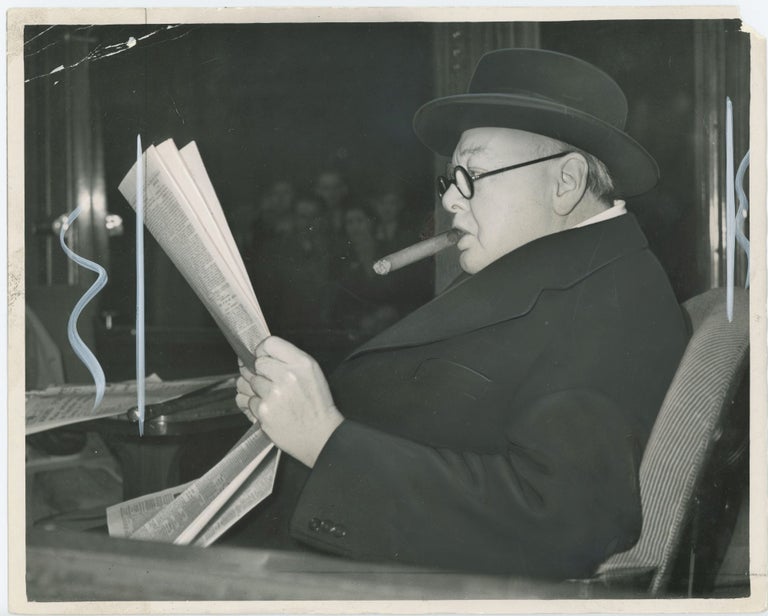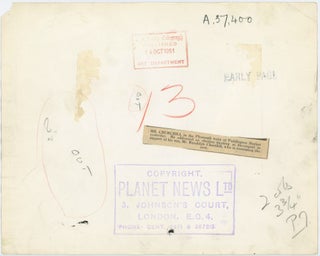An original press photo of Winston S. Churchill on a train on 23 October 1951 after speaking in support of his son Randolph Churchill for the 1951 General Election which returned Churchill to 10 Downing Street for his second and final premiership three days after this photo was taken
London: Copyright Planet News Ltd., published by The Daily Telegraph, 24 October 1951. Photograph. This original press photo captures Winston S. Churchill on 23 October 1951 reading a paper and smoking a cigar on a train after giving a speech in support of the candidacy of his son, Randolph. Three days later the 1951 General election saw Randolph’s defeat, but returned the Conservatives to power and Churchill to 10 Downing Street for his second and final premiership. The gelatin silver print on glossy photo paper measures 8.125 x 10 inches (20.6 x 25.4 cm). Condition is very good minus. The paper is clean and crisp with creasing and a closed tear to the upper left corner, a small loss to the upper right corner largely confined to the margins, some edge wear, and scuffing visible only under raking light. This photo was once a part of the working archive of The Daily Telegraph and features their Art Department’s original hand-applied retouching to Churchill’s face, hands, and clothing as well as original crop markings.
The verso bears the copyright stamp of “Planet News Ltd.”, a received stamp of The Daily Telegraph dated 24 OCT 1951, a stamp reading “EARLY PAGE", handwritten printing notations, and a clipping of the caption as it was published reading, “MR. CHURCHILL in the Plymouth train at Paddington Station yesterday. He addressed an election meeting at Devonport in support of his son, Mr. Randolph Churchill, who is contesting the seat.”
The 1951 General Election was Churchill’s fourteenth since his first parliamentary victory half a century earlier. In his speech Churchill called for national unity, saying “Never before in peacetime did we have so much need to judge policy on the merits and act in the true interests of our country”. He took pains to address the “cruel and ungrateful accusation” that he was a warmonger. “I believe that I may be able to make an important contribution to the prevention of a Third World War… this opportunity… is the last prize I seek to win.” Randolph lost the election by 2,390 votes. Churchill experienced a decisive victory. In his own Woodford constituency his vote tally was nearly double that of his challenger. Despite Randolph’s loss, Churchill’s Conservatives outpaced Labour returning Churchill to 10 Downing Street for his second and final premiership (1951-1955).
Randolph (1911-1968) ultimately failed to fully refine and apply his own Churchillian gifts. Emblematic, he lost every election he contested. (His 1940 victory was unopposed.) Historian Andrew Roberts has said: “Aside from his heroically dismal manners, his gambling, arrogance, vicious temper, indiscretions, and aggression,” Randolph “was generous, patriotic, extravagant and amazingly courageous.” Randolph dwelt in his father’s shadow and often disappointed him. Nonetheless, “Winston Churchill never let the sun go down upon his wrath, and when Randolph’s idleness ended in lecture tours and races for Parliament, he lent his support, even when his son’s campaigns were politically unhelpful to him. During World War II, when Randolph served with distinction in North Africa and Yugoslavia, Winston entrusted him with sensitive tasks which he performed with skill and discretion…
After the war, Churchill willed his invaluable archive to Randolph; and in 1959, he bestowed the ultimate accolade by inviting Randolph to be his official biographer.” (Richard Langworth) Symbolically apt, Randolph completed only the first two volumes before he died in 1968.
During the first half of the twentieth century, photojournalism fundamentally changed the way the public interacted with current events. Newspapers assembled expansive archives, physical copies of photographs their versos typically marked with ink stamps and notes providing provenance and captions. Photo departments often edited the photo surfaces by hand before publication using brush, paint, pencil, and marker. Today these photographs exist as repositories of historical memory, technological artifacts, and often striking pieces of vernacular art. Item #005220
Price: $160.00


